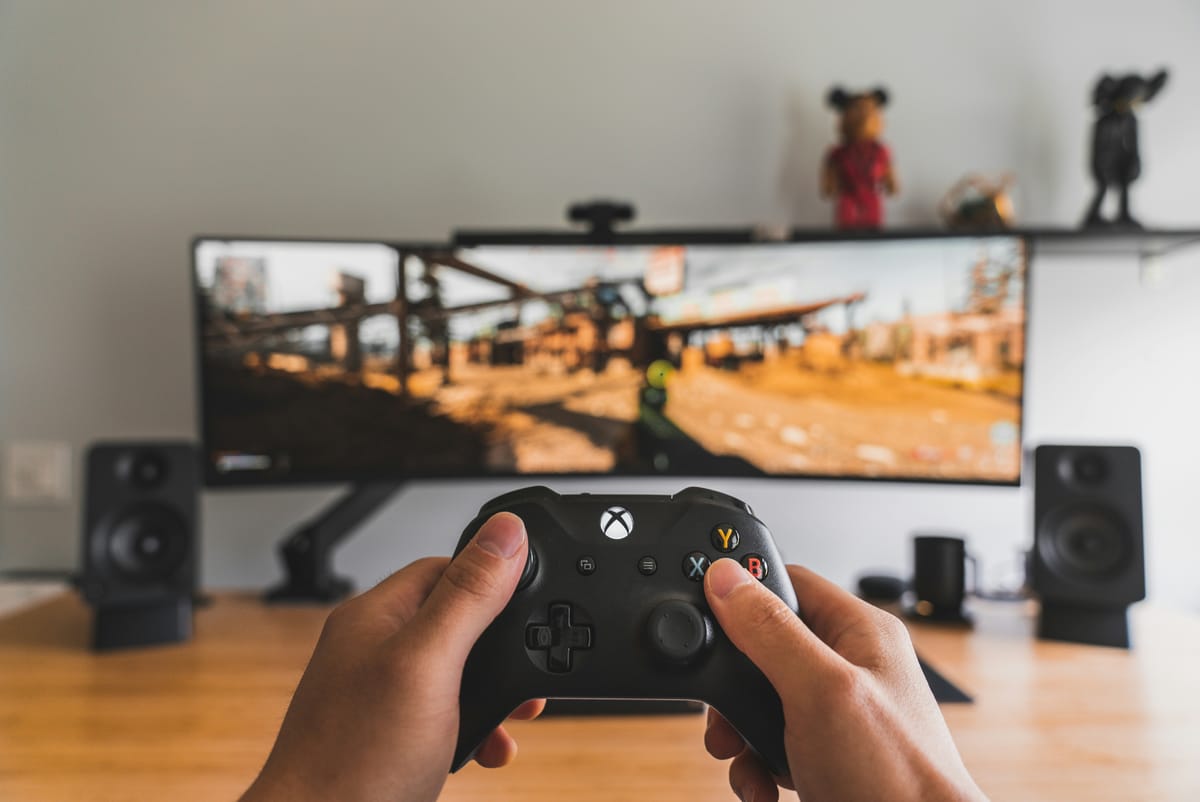Video Games and Cognitive Enhancement: A Comprehensive Analysis of Gaming's Impact on Brain Function

Before diving into the complex relationship between video games and cognitive function, it's worth noting that recent research presents a surprising conclusion: video games may be more beneficial for your brain than traditional physical exercise. This finding challenges conventional wisdom and opens exciting new avenues for cognitive enhancement research.
The Surprising Relationship Between Video Games, Exercise, and Brain Health
Recent studies have revealed an unexpected relationship between video gaming, physical exercise, and their respective impacts on cognition and mental health. A 2024 study conducted at Western University found that individuals who frequently play video games (five or more hours per week) performed cognitively like people who were 13.7 years younger than non-gamers19. This significant finding suggests that regular gaming may slow cognitive aging processes.
Surprisingly, while video games enhanced cognitive performance, they showed no measurable effect on mental health. Conversely, physical exercise (specifically 150 minutes per week, aligning with WHO recommendations) improved mental health but had no significant impact on cognitive function19. Participants meeting exercise recommendations were 12% less likely to report depression symptoms and 9% less likely to report anxiety symptoms9.
As Professor Adrian Owen explains, "I was surprised that video games improved cognition, whereas regular exercise did not, in part because we have shown conclusively in the past that computerized 'brain training' games do not improve cognitive function"1.
Measuring Cognitive Benefits: What the Research Shows
Meta-analyses examining video game training interventions have found consistent evidence supporting cognitive enhancement. A 2023 meta-analysis of 63 studies (118 investigations with 2,079 participants) demonstrated a moderate but significant effect (g = 0.25, p < .001) on overall cognitive function1215. Specific areas showing improvement included:
- Attention and perception: g = .27, 95% CI [.08, .45], p = .004
- Higher-order cognition: g = .31, 95% CI [.1, .51], p = .0036
However, no significant improvements were observed for memory outcomes or psychosocial outcomes in this particular meta-analysis6.
Another systematic review found effect sizes ranging from 0.06 to 3.43 for various cognitive domains, with the largest impacts observed in processing speed and reaction times10. Multiple studies demonstrate that action, first-person shooter (FPS), adventure, and puzzle games can enhance these particular cognitive domains10.
How Video Games Reshape the Brain: Neuroplasticity in Action
Structural Changes
The brain's ability to physically change in response to experience—known as neuroplasticity—plays a key role in how video games affect cognition. Multiple studies using MRI techniques have documented specific structural changes in gamers' brains, including:
- Increased gray matter volume in the hippocampus, dorsolateral prefrontal cortex (DLPFC), and cerebellum after playing 3D adventure games like Super Mario 64511
- Enhanced neural networks in visual-spatial processing areas after playing puzzle games like Tetris5
- Differential effects based on gaming style: A study of first-person shooter games found that "spatial learners" experienced increased gray matter in the hippocampus, while "response learners" showed increased gray matter in the amygdala5
A systematic review examining neuroplasticity specifically noted that "video gaming affects the brain structure and function depending on how the game is played," with beneficial effects varying among different game types5.
Functional Changes
Beyond structural modifications, video games also alter brain function. Research has documented:
- Decreased activity in the dorsolateral prefrontal cortex (DLPFC) after gaming training, suggesting improved neural efficiency5
- Preserved reward system function in the ventral striatum after 3D adventure gaming5
- Changes in functional connectivity in multimodal integration systems and higher-order executive processing after puzzle games5
These findings suggest that different games engage and transform distinct neural networks, potentially offering tailored approaches to cognitive enhancement.
The Cognitive Domains Enhanced by Gaming
Attention and Perception
Multiple studies demonstrate that video games can improve attention and perceptual processing. In a study of nearly 2,000 children, those who played video games for three or more hours daily showed improved impulse control and working memory compared to non-gamers3. Action games particularly excel at enhancing visual attention and processing speed1014.
Processing Speed and Reaction Time
Games requiring quick responses—like action, FPS, and racing games—consistently improve processing speed and reaction times10. This enhancement may transfer to real-world tasks requiring rapid decision-making.
Higher-Order Cognition
Strategy and puzzle games appear particularly effective at enhancing higher-order cognitive processes. Training with the strategy game "Space Fortress" improved visual working memory10, while playing "Portal 2" (a 3D puzzle game) enhanced problem-solving and spatial reasoning skills14.
Mental Flexibility and Task-Switching
Action video games have been shown to improve the ability to switch between competing tasks, a valuable skill in today's multitasking environment14. This cognitive flexibility may explain why frequent gamers demonstrate better performance across various cognitive measures.
Game Types and Their Specific Cognitive Benefits
Different game genres appear to target specific cognitive domains:
Action and FPS Games
These fast-paced games excel at improving:
3D Adventure Games
Games like Super Mario 64 enhance:
Strategy Games
Strategy games strengthen:
Puzzle Games
Puzzle games improve:
- Problem-solving skills
- Spatial reasoning
- Visual-spatial processing514
Recent research suggests that focusing on specific gameplay features rather than broad genre classifications might be more productive for cognitive training purposes. The 2023 meta-analysis concluded that "future video-game interventions targeting cognitive enhancements should consider gameplay feature classification approach over existing genre classification, which may provide more fruitful training-related benefits to cognition"12.
Video Games Across the Lifespan
Gaming's cognitive benefits extend across different age groups:
Young Adults
Multiple studies confirm cognitive enhancements in young adult gamers, particularly in attention, visuospatial skills, and working memory8. Young adults who play video games for more than 5 hours weekly have demonstrated superior visual working memory compared to those who play less8.
Older Adults
Perhaps most surprisingly, older adults may derive substantial benefits from gaming. Research shows that:
- Training older adults with the strategy game "Rise of Nations" improved working memory, task-switching, visual short-term memory, and mental rotation compared to controls14
- Playing video games has been associated with performing cognitively like someone 13.7 years younger, suggesting potential for combating age-related cognitive decline19
These findings are particularly significant given the challenges of cognitive aging and suggest that video games might offer an engaging intervention for maintaining cognitive function in later life.
Practical Implications: How Much Gaming Is Beneficial?
Research suggests that moderate gaming provides optimal cognitive benefits. The Western University study found significant cognitive advantages for individuals playing video games for five or more hours per week for a single game type, with lesser but still notable benefits for those playing less than five hours weekly across all game types19.
Training studies have typically employed 4-24 weeks of gaming with total training hours ranging from 16-90 hours (mean = 40.63 hours)5. These findings suggest that relatively modest gaming commitments can yield measurable cognitive benefits.
Conclusion: Reshaping Our Understanding of Video Games
The growing body of research on video games and cognition challenges longstanding assumptions about gaming's effects on the brain. Far from merely being entertainment, appropriately chosen video games appear to offer genuine cognitive benefits, potentially surpassing traditional physical exercise in some cognitive domains.
As Professor Owen noted, modern games differ substantially from simple brain training programs: "Typically, they are highly engaging, strategic and may enhance visual attention and processing speed, and problem-solving abilities, through intense repetition and practice"1.
While gaming should not replace physical exercise given exercise's clear mental health benefits, incorporating appropriate video games into cognitive enhancement strategies appears increasingly justified by scientific evidence. As research continues to uncover the mechanisms behind gaming's cognitive effects, we may develop increasingly targeted approaches to harness gaming for cognitive enhancement across the lifespan.
Citations:
[1] https://www.hindustantimes.com/lifestyle/health/are-video-games-unfairly-antagonised-study-claims-video-games-are-more-brain-friendly-than-physical-exercise-101729247322638.html
[2] https://museumsandheritage.com/advisor/posts/science-museum-study-suggests-gaming-improves-cognition/
[3] https://nihrecord.nih.gov/2022/11/11/do-video-games-improve-cognitive-performance
[4] https://www.gbhi.org/news-publications/gaming-expertise-induces-meso-scale-brain-plasticity-and-efficiency-mechanisms
[5] https://pmc.ncbi.nlm.nih.gov/articles/PMC6826942/
[6] https://journals.plos.org/plosone/article?id=10.1371%2Fjournal.pone.0285925
[7] https://elevateapp.com/blog/are-video-games-good-for-your-brain
[8] https://pmc.ncbi.nlm.nih.gov/articles/PMC10042352/
[9] https://news.westernu.ca/2024/10/brain-body-study-results/
[10] https://www.frontiersin.org/journals/psychology/articles/10.3389/fpsyg.2018.02127/full
[11] https://pmc.ncbi.nlm.nih.gov/articles/PMC10796710/
[12] https://pubmed.ncbi.nlm.nih.gov/37531408/
[13] https://www.youtube.com/watch?v=6YX5S6dsaaQ
[14] https://learningtransferlab.wiscweb.wisc.edu/wp-content/uploads/sites/280/2017/07/Policy_Insights_from_the_Behavioral_and_Brain_Sciences-2015-Green-101-10.pdf
[15] https://pmc.ncbi.nlm.nih.gov/articles/PMC10395941/
[16] https://kids.frontiersin.org/articles/10.3389/frym.2023.1177758
[17] https://lfpress.com/news/local-news/play-on-video-games-may-actually-help-boost-your-brain-london-researchers
[18] https://tmb.apaopen.org/pub/qj0c4ij2
[19] https://neurosciencenews.com/cognition-exercise-gaming-27891/
[20] https://www.nature.com/articles/mp2013120
[21] https://www.nih.gov/news-events/news-releases/video-gaming-may-be-associated-better-cognitive-performance-children
[22] https://www.thescientificteen.org/post/neuroplasticity-and-video-games
[23] https://www.sciencedirect.com/science/article/pii/S1877050920324698
[24] https://journals.plos.org/plosone/article/figure/image?size=medium&id=10.1371%2Fjournal.pone.0283654.g001&sa=X&ved=2ahUKEwiYyK2q2caMAxXld_UHHaliIzsQ_B16BAgIEAI
[25] https://www.sciencedirect.com/science/article/abs/pii/B978044463934900010X
[26] https://jamanetwork.com/journals/jamanetworkopen/fullarticle/2797596
[27] https://pubmed.ncbi.nlm.nih.gov/22095065/
[28] https://www.sciencedirect.com/science/article/pii/S0003687021001241
[29] https://www.medicalnewstoday.com/articles/318345
[30] https://www.frontiersin.org/journals/psychology/articles/10.3389/fpsyg.2016.00907/full
[31] https://store.steampowered.com/app/826030/BrainPower/





